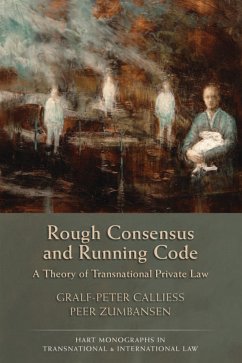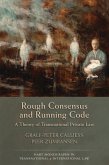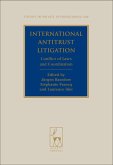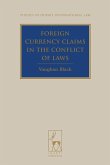Gralf-Peter Calliess, Peer Zumbansen
Rough Consensus and Running Code (eBook, PDF)
A Theory of Transnational Private Law
31,95 €
31,95 €
inkl. MwSt.
Sofort per Download lieferbar

16 °P sammeln
31,95 €
Als Download kaufen

31,95 €
inkl. MwSt.
Sofort per Download lieferbar

16 °P sammeln
Jetzt verschenken
Alle Infos zum eBook verschenken
31,95 €
inkl. MwSt.
Sofort per Download lieferbar
Alle Infos zum eBook verschenken

16 °P sammeln
Gralf-Peter Calliess, Peer Zumbansen
Rough Consensus and Running Code (eBook, PDF)
A Theory of Transnational Private Law
- Format: PDF
- Merkliste
- Auf die Merkliste
- Bewerten Bewerten
- Teilen
- Produkt teilen
- Produkterinnerung
- Produkterinnerung

Bitte loggen Sie sich zunächst in Ihr Kundenkonto ein oder registrieren Sie sich bei
bücher.de, um das eBook-Abo tolino select nutzen zu können.
Hier können Sie sich einloggen
Hier können Sie sich einloggen
Sie sind bereits eingeloggt. Klicken Sie auf 2. tolino select Abo, um fortzufahren.

Bitte loggen Sie sich zunächst in Ihr Kundenkonto ein oder registrieren Sie sich bei bücher.de, um das eBook-Abo tolino select nutzen zu können.
Private law has long been the focus of efforts to explain wider developments of law in an era of globalisation. As consumer transactions and corporate activities continue to develop with scant regard to legal and national boundaries, private law theorists have begun to sketch and conceptualise the possible architecture of a transnational legal theory. Drawing a detailed map of the mixed regulatory landscape of 'hard' and 'soft' laws, official, unofficial, direct and indirect modes of regulation, rules, recommendations and principles as well as exploring the concept of governance through…mehr
- Geräte: PC
- mit Kopierschutz
- eBook Hilfe
- Größe: 1.13MB
Andere Kunden interessierten sich auch für
![Rough Consensus and Running Code (eBook, ePUB) Rough Consensus and Running Code (eBook, ePUB)]() Gralf-Peter CalliessRough Consensus and Running Code (eBook, ePUB)31,95 €
Gralf-Peter CalliessRough Consensus and Running Code (eBook, ePUB)31,95 €![The Hague Child Abduction Convention (eBook, PDF) The Hague Child Abduction Convention (eBook, PDF)]() Rhona SchuzThe Hague Child Abduction Convention (eBook, PDF)100,95 €
Rhona SchuzThe Hague Child Abduction Convention (eBook, PDF)100,95 €![International Antitrust Litigation (eBook, PDF) International Antitrust Litigation (eBook, PDF)]() International Antitrust Litigation (eBook, PDF)149,95 €
International Antitrust Litigation (eBook, PDF)149,95 €![Indonesian Private International Law (eBook, PDF) Indonesian Private International Law (eBook, PDF)]() Afifah KusumadaraIndonesian Private International Law (eBook, PDF)124,95 €
Afifah KusumadaraIndonesian Private International Law (eBook, PDF)124,95 €![The Application of Foreign Law in the British and German Courts (eBook, PDF) The Application of Foreign Law in the British and German Courts (eBook, PDF)]() Alexander Dj CritchleyThe Application of Foreign Law in the British and German Courts (eBook, PDF)34,95 €
Alexander Dj CritchleyThe Application of Foreign Law in the British and German Courts (eBook, PDF)34,95 €![Foreign Currency Claims in the Conflict of Laws (eBook, PDF) Foreign Currency Claims in the Conflict of Laws (eBook, PDF)]() Vaughan BlackForeign Currency Claims in the Conflict of Laws (eBook, PDF)70,95 €
Vaughan BlackForeign Currency Claims in the Conflict of Laws (eBook, PDF)70,95 €![The Private International Law of Authentic Instruments (eBook, PDF) The Private International Law of Authentic Instruments (eBook, PDF)]() Jonathan FitchenThe Private International Law of Authentic Instruments (eBook, PDF)41,95 €
Jonathan FitchenThe Private International Law of Authentic Instruments (eBook, PDF)41,95 €-
-
-
Private law has long been the focus of efforts to explain wider developments of law in an era of globalisation. As consumer transactions and corporate activities continue to develop with scant regard to legal and national boundaries, private law theorists have begun to sketch and conceptualise the possible architecture of a transnational legal theory. Drawing a detailed map of the mixed regulatory landscape of 'hard' and 'soft' laws, official, unofficial, direct and indirect modes of regulation, rules, recommendations and principles as well as exploring the concept of governance through disclosure and transparency, this book develops a theoretical framework of transnational legal regulation. Rough Consensus and Running Code describes and analyses different law-making regimes currently observable in the transnational arena. Its core aim is to reassess the transnational regulation of consumer contracts and corporate governance in light of a dramatic proliferation of rule-creators and compliance mechanisms that can no longer be clearly associated with either the 'state' or the 'market'. The chosen examples from two of the most dynamic legal fields in the transnational arena today serve as backdrops for a comprehensive legal theoretical inquiry into the changing institutional and normative landscape of legal norm-creation.
Produktdetails
- Produktdetails
- Verlag: Bloomsbury eBooks UK
- Seitenzahl: 382
- Erscheinungstermin: 31. Mai 2010
- Englisch
- ISBN-13: 9781847315823
- Artikelnr.: 41829948
- Verlag: Bloomsbury eBooks UK
- Seitenzahl: 382
- Erscheinungstermin: 31. Mai 2010
- Englisch
- ISBN-13: 9781847315823
- Artikelnr.: 41829948
- Herstellerkennzeichnung Die Herstellerinformationen sind derzeit nicht verfügbar.
Gralf-Peter Calliess (LLB, PhD Göttingen, Habilitation Frankfurt) holds the Chair in Private Law, Comparative and International Economic Law, University of Bremen Faculty of Law. Professor Calliess is Director of the A4 Project ('New Forms of Legal Certainty in Globalized Exchange Processes') at the Collaborative Research Centre 'Transformations of the State'.
Introduction
1. Law's Elusive Boundaries
I. Border Crossings
II. Towards a Legal Critique of Transnational Governance Institutions
III. Law's Elusive Empire?
2. Towards A Theory of Transnational Private Law
I. Seeing the (Global) World Through a Private Lawyer's Eyes
A. Crucial Intersections: Lex mercatoria and Legal Pluralism
B. Communities of Interest and Private Governance Regimes: The Conundrum of
Transnational Commercial Law
C. Markets as Regulators: It's the Economy, Stupid-Or, is It?
D. Law and the Transformation of State Regulatory Functions
II. Ubiquitous Law
A. Normativity versus Realism: Law versus Power
B. The Transnational: A Realm of Borderless Self-Regulation?
C. Private Ordering and Public Authority: Scrutinising Democratic versus
Economic Functions of Law
III. A Theory of Transnational Private Law
A. Co-ordination versus Regulation: Revisiting the Public-Private Divide
B. The Hybrid Character of Transnational Law Regimes
C. The Governance Mode of Transnational Law Regimes
(i) Mapping Economic Governance
(ii) The Recombinant Governance Mode of Transnational Commercial Law
D. Soft Law, Hard Law, and Legitimacy
E. Rough Consensus and Running Code
(i) Internet Governance: Legitimising Open Technical Standards
(ii) Private Law Harmonisation
(iii) Modern Customary Law
(iv) The Making of Transnational Private Law
3. Transnational Consumer Contracts
I. Private Ordering in B2C E-Commerce
A. Online Reputation
B. Trustmarks and Codes of Conduct
C. Online Dispute Resolution
D. Method of Payment and Credit Security
II. Transnational Law Regimes: the Role of Virtual Marketplaces
III. Reflexive Consumer Protection Law
A. Reflexive Trustmarks: Contractual Standards of Hybrid Organisations
(i) Secondary Trustmarks at the National Level
(ii) Supranational Standardisation via Co-Regulation?
(iii) Global Linkage
B. Law-Consumer Protection: ODR Standards and their Implementation
(i) Guidelines for providers of ODR procedures
(ii) The Implementation of Global ODR Standards
IV. RCRC in the Making of Transnational Consumer Contract Law
4. Transnational Corporate Governance
I. Corporate Governance Codes
A. Corporate Governance
B. Corporate Governance and Political Economy
C. Law-Making in Corporate Governance
(i) The German Corporate Governance Code as an Example of RCRC
(ii) Who Makes Company Law?
(iii) Corporate Law Making Between State and Society
(iv) The Reform of German Corporate Governance: The Intricacies of Rough
Consensus and Running Code
II. Transnational Corporate Governance and Executive Compensation
A. The Transnational Embeddedness of European Corporate Governance
Regulation
B. 'New' and 'Experimentalist Governance' in European Corporate Law
Regulation: RCRC as Transnational Legal Pluralism
(i) The Polarities of EU Governance: Global Competitiveness and
Political-Economic Integration
(ii) Reflexive Corporate Governance
(iii) European Corporate Governance Regulation and RCRC
C. The Case of Executive Compensation
(i) Breaking the Political Deadlock: Governance by Expertise
(ii) Executive Compensation: Governance by Transparency
D. 'Germany Inc' and Executive Compensation
(i) The Political Economy of Corporate Governance Reform in Germany
(a) Governing 'Germany Inc'
(b) Hybridisation of Law-Making: The Return of the State?
(ii) Transnational Corporate Governance as Spatio-Temporal Assemblage
E. Transnational Corporate Governance Regulation as RCRC
5. Rough Consensus and Running Code in Context
I. Law and Social Norms
II. Soft Law
A. Asking the Right Questions?
B. Soft Law as Embarrassment
III. Customary International Law (And Its Limits)
A. Elements of Customary International Law
B. Ships Passing in the Night?
C. The Attack on Customary International Law
D. Customary International Law in the Making of Global Law
IV. Transnational Private Law: Hard Law, Soft Law, Reflexive Law and the
Conditions for Private Law-Making
1. Law's Elusive Boundaries
I. Border Crossings
II. Towards a Legal Critique of Transnational Governance Institutions
III. Law's Elusive Empire?
2. Towards A Theory of Transnational Private Law
I. Seeing the (Global) World Through a Private Lawyer's Eyes
A. Crucial Intersections: Lex mercatoria and Legal Pluralism
B. Communities of Interest and Private Governance Regimes: The Conundrum of
Transnational Commercial Law
C. Markets as Regulators: It's the Economy, Stupid-Or, is It?
D. Law and the Transformation of State Regulatory Functions
II. Ubiquitous Law
A. Normativity versus Realism: Law versus Power
B. The Transnational: A Realm of Borderless Self-Regulation?
C. Private Ordering and Public Authority: Scrutinising Democratic versus
Economic Functions of Law
III. A Theory of Transnational Private Law
A. Co-ordination versus Regulation: Revisiting the Public-Private Divide
B. The Hybrid Character of Transnational Law Regimes
C. The Governance Mode of Transnational Law Regimes
(i) Mapping Economic Governance
(ii) The Recombinant Governance Mode of Transnational Commercial Law
D. Soft Law, Hard Law, and Legitimacy
E. Rough Consensus and Running Code
(i) Internet Governance: Legitimising Open Technical Standards
(ii) Private Law Harmonisation
(iii) Modern Customary Law
(iv) The Making of Transnational Private Law
3. Transnational Consumer Contracts
I. Private Ordering in B2C E-Commerce
A. Online Reputation
B. Trustmarks and Codes of Conduct
C. Online Dispute Resolution
D. Method of Payment and Credit Security
II. Transnational Law Regimes: the Role of Virtual Marketplaces
III. Reflexive Consumer Protection Law
A. Reflexive Trustmarks: Contractual Standards of Hybrid Organisations
(i) Secondary Trustmarks at the National Level
(ii) Supranational Standardisation via Co-Regulation?
(iii) Global Linkage
B. Law-Consumer Protection: ODR Standards and their Implementation
(i) Guidelines for providers of ODR procedures
(ii) The Implementation of Global ODR Standards
IV. RCRC in the Making of Transnational Consumer Contract Law
4. Transnational Corporate Governance
I. Corporate Governance Codes
A. Corporate Governance
B. Corporate Governance and Political Economy
C. Law-Making in Corporate Governance
(i) The German Corporate Governance Code as an Example of RCRC
(ii) Who Makes Company Law?
(iii) Corporate Law Making Between State and Society
(iv) The Reform of German Corporate Governance: The Intricacies of Rough
Consensus and Running Code
II. Transnational Corporate Governance and Executive Compensation
A. The Transnational Embeddedness of European Corporate Governance
Regulation
B. 'New' and 'Experimentalist Governance' in European Corporate Law
Regulation: RCRC as Transnational Legal Pluralism
(i) The Polarities of EU Governance: Global Competitiveness and
Political-Economic Integration
(ii) Reflexive Corporate Governance
(iii) European Corporate Governance Regulation and RCRC
C. The Case of Executive Compensation
(i) Breaking the Political Deadlock: Governance by Expertise
(ii) Executive Compensation: Governance by Transparency
D. 'Germany Inc' and Executive Compensation
(i) The Political Economy of Corporate Governance Reform in Germany
(a) Governing 'Germany Inc'
(b) Hybridisation of Law-Making: The Return of the State?
(ii) Transnational Corporate Governance as Spatio-Temporal Assemblage
E. Transnational Corporate Governance Regulation as RCRC
5. Rough Consensus and Running Code in Context
I. Law and Social Norms
II. Soft Law
A. Asking the Right Questions?
B. Soft Law as Embarrassment
III. Customary International Law (And Its Limits)
A. Elements of Customary International Law
B. Ships Passing in the Night?
C. The Attack on Customary International Law
D. Customary International Law in the Making of Global Law
IV. Transnational Private Law: Hard Law, Soft Law, Reflexive Law and the
Conditions for Private Law-Making
Introduction
1. Law's Elusive Boundaries
I. Border Crossings
II. Towards a Legal Critique of Transnational Governance Institutions
III. Law's Elusive Empire?
2. Towards A Theory of Transnational Private Law
I. Seeing the (Global) World Through a Private Lawyer's Eyes
A. Crucial Intersections: Lex mercatoria and Legal Pluralism
B. Communities of Interest and Private Governance Regimes: The Conundrum of
Transnational Commercial Law
C. Markets as Regulators: It's the Economy, Stupid-Or, is It?
D. Law and the Transformation of State Regulatory Functions
II. Ubiquitous Law
A. Normativity versus Realism: Law versus Power
B. The Transnational: A Realm of Borderless Self-Regulation?
C. Private Ordering and Public Authority: Scrutinising Democratic versus
Economic Functions of Law
III. A Theory of Transnational Private Law
A. Co-ordination versus Regulation: Revisiting the Public-Private Divide
B. The Hybrid Character of Transnational Law Regimes
C. The Governance Mode of Transnational Law Regimes
(i) Mapping Economic Governance
(ii) The Recombinant Governance Mode of Transnational Commercial Law
D. Soft Law, Hard Law, and Legitimacy
E. Rough Consensus and Running Code
(i) Internet Governance: Legitimising Open Technical Standards
(ii) Private Law Harmonisation
(iii) Modern Customary Law
(iv) The Making of Transnational Private Law
3. Transnational Consumer Contracts
I. Private Ordering in B2C E-Commerce
A. Online Reputation
B. Trustmarks and Codes of Conduct
C. Online Dispute Resolution
D. Method of Payment and Credit Security
II. Transnational Law Regimes: the Role of Virtual Marketplaces
III. Reflexive Consumer Protection Law
A. Reflexive Trustmarks: Contractual Standards of Hybrid Organisations
(i) Secondary Trustmarks at the National Level
(ii) Supranational Standardisation via Co-Regulation?
(iii) Global Linkage
B. Law-Consumer Protection: ODR Standards and their Implementation
(i) Guidelines for providers of ODR procedures
(ii) The Implementation of Global ODR Standards
IV. RCRC in the Making of Transnational Consumer Contract Law
4. Transnational Corporate Governance
I. Corporate Governance Codes
A. Corporate Governance
B. Corporate Governance and Political Economy
C. Law-Making in Corporate Governance
(i) The German Corporate Governance Code as an Example of RCRC
(ii) Who Makes Company Law?
(iii) Corporate Law Making Between State and Society
(iv) The Reform of German Corporate Governance: The Intricacies of Rough
Consensus and Running Code
II. Transnational Corporate Governance and Executive Compensation
A. The Transnational Embeddedness of European Corporate Governance
Regulation
B. 'New' and 'Experimentalist Governance' in European Corporate Law
Regulation: RCRC as Transnational Legal Pluralism
(i) The Polarities of EU Governance: Global Competitiveness and
Political-Economic Integration
(ii) Reflexive Corporate Governance
(iii) European Corporate Governance Regulation and RCRC
C. The Case of Executive Compensation
(i) Breaking the Political Deadlock: Governance by Expertise
(ii) Executive Compensation: Governance by Transparency
D. 'Germany Inc' and Executive Compensation
(i) The Political Economy of Corporate Governance Reform in Germany
(a) Governing 'Germany Inc'
(b) Hybridisation of Law-Making: The Return of the State?
(ii) Transnational Corporate Governance as Spatio-Temporal Assemblage
E. Transnational Corporate Governance Regulation as RCRC
5. Rough Consensus and Running Code in Context
I. Law and Social Norms
II. Soft Law
A. Asking the Right Questions?
B. Soft Law as Embarrassment
III. Customary International Law (And Its Limits)
A. Elements of Customary International Law
B. Ships Passing in the Night?
C. The Attack on Customary International Law
D. Customary International Law in the Making of Global Law
IV. Transnational Private Law: Hard Law, Soft Law, Reflexive Law and the
Conditions for Private Law-Making
1. Law's Elusive Boundaries
I. Border Crossings
II. Towards a Legal Critique of Transnational Governance Institutions
III. Law's Elusive Empire?
2. Towards A Theory of Transnational Private Law
I. Seeing the (Global) World Through a Private Lawyer's Eyes
A. Crucial Intersections: Lex mercatoria and Legal Pluralism
B. Communities of Interest and Private Governance Regimes: The Conundrum of
Transnational Commercial Law
C. Markets as Regulators: It's the Economy, Stupid-Or, is It?
D. Law and the Transformation of State Regulatory Functions
II. Ubiquitous Law
A. Normativity versus Realism: Law versus Power
B. The Transnational: A Realm of Borderless Self-Regulation?
C. Private Ordering and Public Authority: Scrutinising Democratic versus
Economic Functions of Law
III. A Theory of Transnational Private Law
A. Co-ordination versus Regulation: Revisiting the Public-Private Divide
B. The Hybrid Character of Transnational Law Regimes
C. The Governance Mode of Transnational Law Regimes
(i) Mapping Economic Governance
(ii) The Recombinant Governance Mode of Transnational Commercial Law
D. Soft Law, Hard Law, and Legitimacy
E. Rough Consensus and Running Code
(i) Internet Governance: Legitimising Open Technical Standards
(ii) Private Law Harmonisation
(iii) Modern Customary Law
(iv) The Making of Transnational Private Law
3. Transnational Consumer Contracts
I. Private Ordering in B2C E-Commerce
A. Online Reputation
B. Trustmarks and Codes of Conduct
C. Online Dispute Resolution
D. Method of Payment and Credit Security
II. Transnational Law Regimes: the Role of Virtual Marketplaces
III. Reflexive Consumer Protection Law
A. Reflexive Trustmarks: Contractual Standards of Hybrid Organisations
(i) Secondary Trustmarks at the National Level
(ii) Supranational Standardisation via Co-Regulation?
(iii) Global Linkage
B. Law-Consumer Protection: ODR Standards and their Implementation
(i) Guidelines for providers of ODR procedures
(ii) The Implementation of Global ODR Standards
IV. RCRC in the Making of Transnational Consumer Contract Law
4. Transnational Corporate Governance
I. Corporate Governance Codes
A. Corporate Governance
B. Corporate Governance and Political Economy
C. Law-Making in Corporate Governance
(i) The German Corporate Governance Code as an Example of RCRC
(ii) Who Makes Company Law?
(iii) Corporate Law Making Between State and Society
(iv) The Reform of German Corporate Governance: The Intricacies of Rough
Consensus and Running Code
II. Transnational Corporate Governance and Executive Compensation
A. The Transnational Embeddedness of European Corporate Governance
Regulation
B. 'New' and 'Experimentalist Governance' in European Corporate Law
Regulation: RCRC as Transnational Legal Pluralism
(i) The Polarities of EU Governance: Global Competitiveness and
Political-Economic Integration
(ii) Reflexive Corporate Governance
(iii) European Corporate Governance Regulation and RCRC
C. The Case of Executive Compensation
(i) Breaking the Political Deadlock: Governance by Expertise
(ii) Executive Compensation: Governance by Transparency
D. 'Germany Inc' and Executive Compensation
(i) The Political Economy of Corporate Governance Reform in Germany
(a) Governing 'Germany Inc'
(b) Hybridisation of Law-Making: The Return of the State?
(ii) Transnational Corporate Governance as Spatio-Temporal Assemblage
E. Transnational Corporate Governance Regulation as RCRC
5. Rough Consensus and Running Code in Context
I. Law and Social Norms
II. Soft Law
A. Asking the Right Questions?
B. Soft Law as Embarrassment
III. Customary International Law (And Its Limits)
A. Elements of Customary International Law
B. Ships Passing in the Night?
C. The Attack on Customary International Law
D. Customary International Law in the Making of Global Law
IV. Transnational Private Law: Hard Law, Soft Law, Reflexive Law and the
Conditions for Private Law-Making







